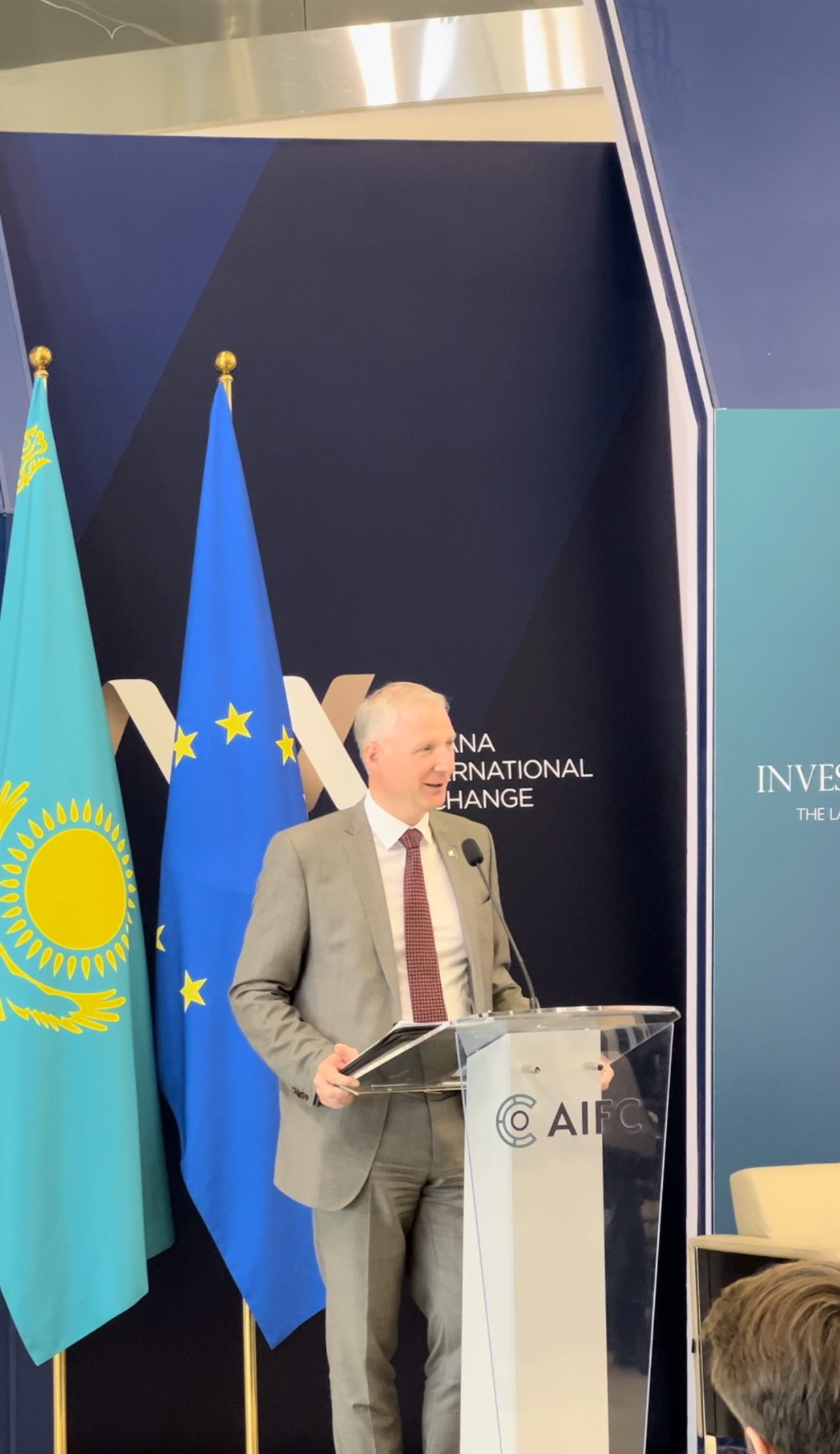ASTANA – The Kazakh and European Union (EU) business representatives and officials explored the opportunities and challenges related to establishing cooperation in critical raw materials during a July 4 forum in Astana.

Meeting participants discussed cooperation in mining critical materials. Photo credit: The Astana Times.
Speaking about the Kazakh-EU cooperation, Turar Zholmagambetov, deputy chairman of the Industrial Development Committee at the Kazakh Ministry of Industry and Infrastructure Development, referred to an agreement on raw materials, batteries and renewable hydrogen signed by Kazakh Prime Minister Alikhan Smailov and President of the European Commission Ursula von der Leyen in November last year.
“The interests of business and the Kazakh government align in the field of rare earth metals, adhering to the proposal – raw materials in exchange for technology and competence. Our goal is to both supply raw materials and produce a specific item from our raw materials for finished products, which would create a balanced partnership,” Zholmagambetov said, citing the example of electric car production.
Kazakh Vice Minister of Industry and Infrastructure Development Ilyas Ospanov focused on the green economy, ecological production, the wider economy and global responsibility, expressing hope that both sides will be able to establish adequate systems and address problems on an individual basis.
“My vision for the future is that we will establish joint ventures that will be flagships in the development of critical raw materials and will serve as examples for the development of other industries and for other countries,” he said.

EU Ambassador to Kazakhstan Kestutis Jankauskas. Photo credit: The Astana Times.
According to the EU Ambassador to Kazakhstan, Kestutis Jankauskas, the EU and Kazakhstan enjoy a good record of cooperation and a reliable trade and investment partnership based on the Enhanced Partnership and Cooperation Agreement. The sides have specific areas of mutual interest, particularly in renewable energy and economic diversification.
“There are quite big possibilities to develop business in the area of green hydrogen, climate change, digital connectivity, transportation, critical raw materials and agriculture. Some of this is driven by necessity, because we need rare earth metals for the Green Deal. Kazakhstan needs technologies, while the EU needs alternative supply sources,” he said.
Regarding the challenges, Jankauskas said both sides are interested in a sanctions-free predictable transportation route. It is crucial to ensure a stable, secure and transparent business climate for businesses. Global competition for investments and the availability of a skilled labor force are two interrelated areas.
“Today, we need to think about which professions will be needed in four or five years. I believe there should be better cooperation between universities and businesses, because it is also in the mutual interest to teach what is needed in the coming years,” he said.
Due to cooperation with Kazakhstan, the EU expects a reduction in supplies from China by up to 50%.
“Dependence of 90% on one source is dependence. It is convenient for us, as consumers, when there is a choice of three or five suppliers. We really hope that Kazakhstan, and Central Asia as a whole, can be one of those regions that will be an alternative supplier. We expect a decrease from 90% to 50% from one source and 15-20% from other sources,” said Jankauskas.
Addressing the meeting participants, the Director of the Investment Department at the Astana International Financial Centre (AIFC) Marat Birimzhan focused on how the AIFC can help EU partners run and structure their business in Kazakhstan and the region.
“The AIFC was created to strengthen the rule of law, enhance protection of the investors’ rights, and provide clarity on the regulatory framework based on international standards,” he said.
The AIFC provides world-class jurisdiction based on the principles of English common law and tax optimization tools, exempting from tax on dividends and tax on capital gains.
“It provides easy repatriation of profits, no capital gains, no tax on dividends, which further enhances the compelling value proposition that Kazakhstan can offer to the international investor community,” he added.
According to Birimzhan, the mining industry made up 14.1% of Kazakhstan’s gross domestic product and 17.5% of the country’s exports in 2021, though investments into exploration in the mining sector and cooperation development with the EU and many other partners can double these numbers, he said.
“Over the last 30 years, Kazakhstan has attracted $380 billion of foreign direct investment, the majority of which is coming from the EU. The influence and the cooperation is massive. However, there is potential to double that cooperation in every sector, particularly in mining,” Birimzhan noted.
According to the Kazakh Minister of Industry and Infrastructure Development Marat Karabayev, out of 30 rare earth materials crucial for the EU economy, such as titanium, beryllium, tantalum, and niobium, Kazakh companies currently produce 16. Kazakhstan has known deposits of nine additional ones that, too, can be produced with relevant investments in development and production. As for the remaining five, he said, “we are ready to explore them.”
Karabayev said that approximately 150 Kazakh companies are going to attend the upcoming Raw Materials Week, which will take place on Nov. 13-17 in Brussels, Belgium. Kazakhstan will hold a major event on Nov. 16 to promote Kazakh subsoil companies.
